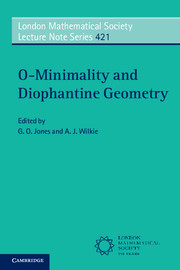Book contents
- Frontmatter
- Contents
- Preface
- 1 The Manin-Mumford Conjecture, an elliptic Curve, its Torsion Points & their Galois Orbits
- 2 Rational points on definable sets
- 3 Functional transcendence via o-minimality
- 4 Introduction to abelian varieties and the Ax–Lindemann–Weierstrass theorem
- 5 The André-Oort conjecture via o-minimality
- 6 Lectures on elimination theory for semialgebraic and subanalytic sets
- 7 Relative Manin-Mumford for abelian varieties
- 8 Improving the bound in the Pila-Wilkie theorem for curves
- 9 Ax-Schanuel and o-minimality
4 - Introduction to abelian varieties and the Ax–Lindemann–Weierstrass theorem
Published online by Cambridge University Press: 05 August 2015
- Frontmatter
- Contents
- Preface
- 1 The Manin-Mumford Conjecture, an elliptic Curve, its Torsion Points & their Galois Orbits
- 2 Rational points on definable sets
- 3 Functional transcendence via o-minimality
- 4 Introduction to abelian varieties and the Ax–Lindemann–Weierstrass theorem
- 5 The André-Oort conjecture via o-minimality
- 6 Lectures on elimination theory for semialgebraic and subanalytic sets
- 7 Relative Manin-Mumford for abelian varieties
- 8 Improving the bound in the Pila-Wilkie theorem for curves
- 9 Ax-Schanuel and o-minimality
Summary
Introduction
This paper surveys some aspects of the theory of abelian varieties relevant to the Pila–Zannier proof of the Manin–Mumford conjecture and to the André– Oort conjecture. An abelian variety is a complete algebraic variety with a group law. The geometry of abelian varieties is tightly constrained and well-behaved, and they are important tools in algebraic geometry. Abelian varieties defined over number fields pose interesting arithmetic problems, for example concerning their rational points and associated Galois representations.
The paper is in three parts:
(1) an introduction to abelian varieties;
(2) an outline of moduli spaces of principally polarised abelian varieties, which are the fundamental examples of Shimura varieties;
(3) a detailed proof of the Ax–Lindemann–Weierstrass theorem for abelian varieties, following amethod using o-minimal geometry due to Pila, Ullmo and Yafaev.
The first part assumes only an elementary knowledge of algebraic varieties and complex analytic geometry. The second part makes heavier use of algebraic geometry, but still at the level of varieties, and a little algebraic number theory. Like the first part, the algebraic geometry in the third part is elementary; the third part also assumes familiarity with the concept of semialgebraic sets, and uses cell decomposition for semialgebraic sets and the Pila–Wilkie theorem as black boxes. The second and third parts are independent of each other, so the reader interested primarily in the Ax–Lindemann–Weierstrass theorem may skip the second part (sections 4 to 6).
In the first part of the paper (sections 2 and 3), we introduce abelian varieties over fields of characteristic zero, and especially over the complex numbers. The theory of abelian varieties over fields of positive characteristic introduces additional complications which we will not discuss. Our choice of topics is driven by Pila and Zannier's proof of the Manin–Mumford conjecture using o-minimal geometry. We will not discuss the Manin–Mumford conjecture or its proofs directly in this paper; aspects of the proof, and its generalisation to Shimura varieties, are discussed in other papers in this volume.
Information
- Type
- Chapter
- Information
- O-Minimality and Diophantine Geometry , pp. 100 - 128Publisher: Cambridge University PressPrint publication year: 2015
Accessibility standard: Unknown
Why this information is here
This section outlines the accessibility features of this content - including support for screen readers, full keyboard navigation and high-contrast display options. This may not be relevant for you.Accessibility Information
- 2
- Cited by
